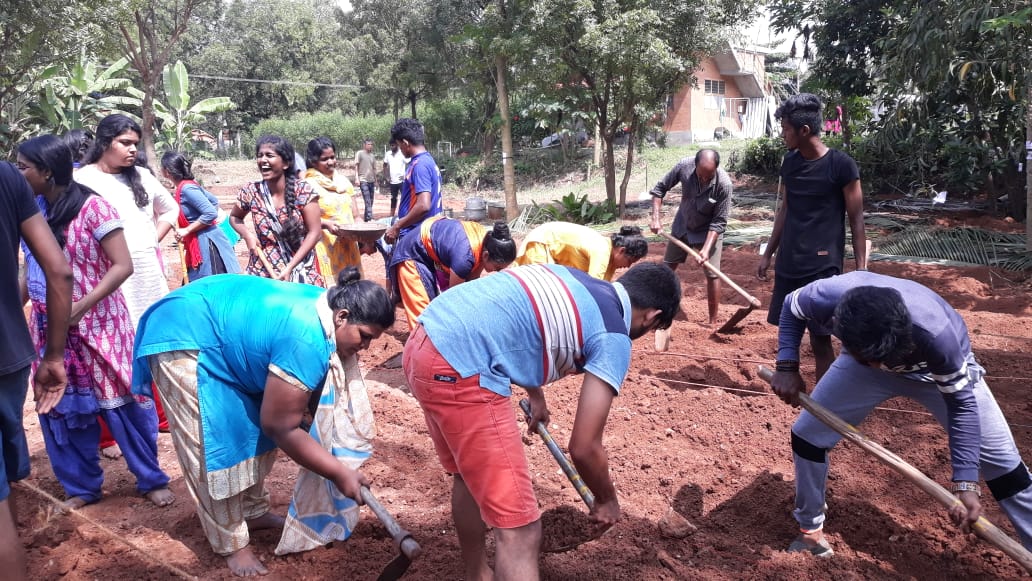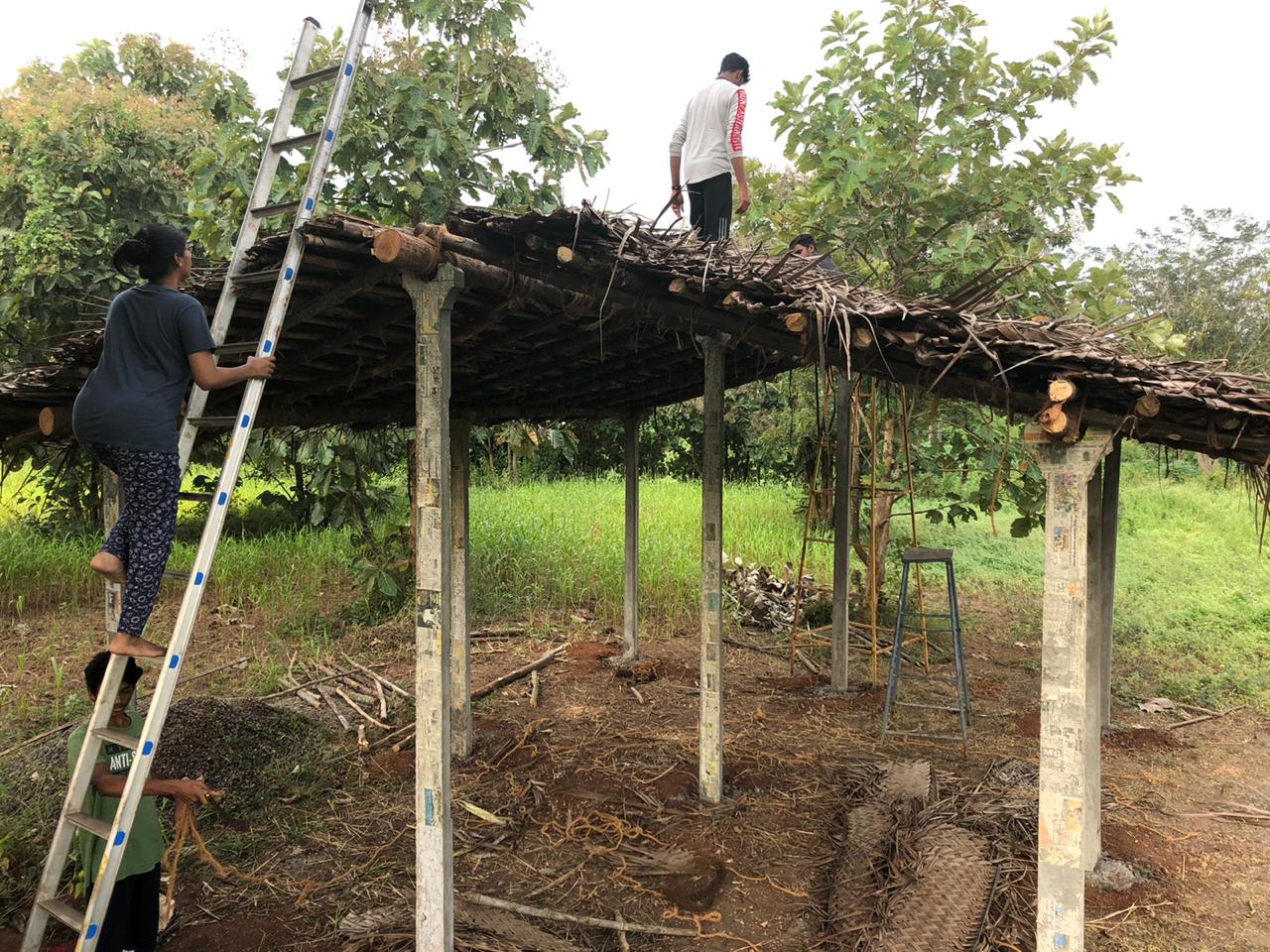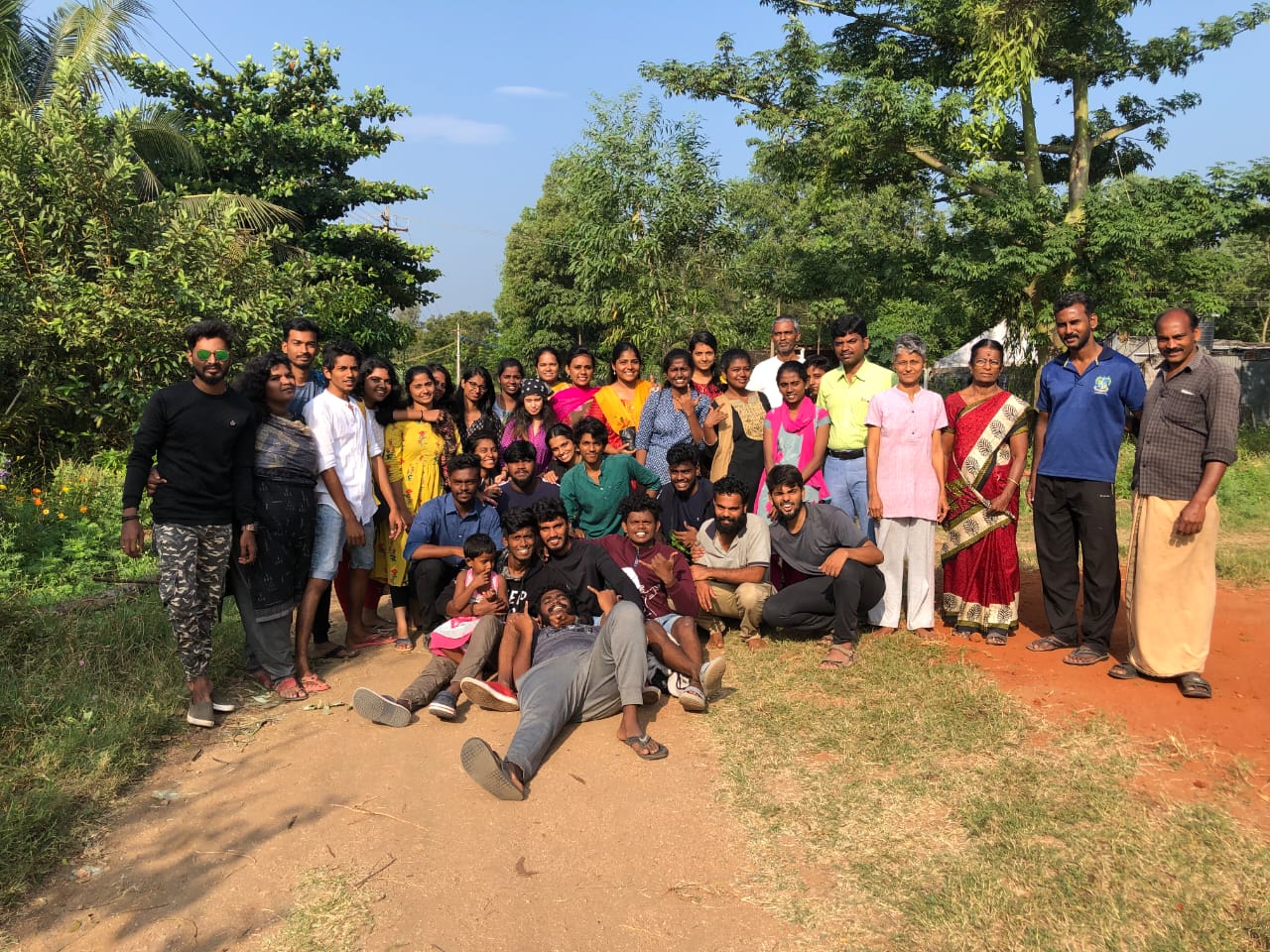Alternarratives – Field Report

End of the second day, one of the participants, a 22 years old boy shared,
“I called up my mom and cried.”
He was a participant in Alternarratives, a ten day program conducted in an organic farm by aKarma Trust in November 2019.
That statement above, captures a lot about the critical issues faced by millions of people around the world, especially young people. It also captures hope in a not so obvious way.
The boy’s grief was not due to some insurmountable difficulty he had faced at the farm. Like 35 other students, he was asked to do farm work for about six hours between 7 am and 4 pm with breakfast and lunch breaks. Breakfast was fruit salad and raw vegetable salad buffet was the lunch. This was supposed to be part of the learning, agreed upon before the program started.
Yes, farm work can be hard. And a raw-food diet twice a day can be harder (dinner was cooked). Agreed, for city dwellers, these are complaint-worthy challenges. But calling up Mom? And crying?
It is easy to dismiss this as an anomaly, as one unusually weak student. But over the next eight days, we discovered a similar state of mind in most of the students. Some were good at hiding it. Some were not.
It reveals how underdeveloped and under-prepared most people are, physically and psychologically, in dealing with two fundamentals of life: work and food.
This lack of readiness is due to the extremely narrow perspectives people have, unintentionally, on work and food.
These narrow perspectives have been engineered over the last century by the Materialist-Capitalist-Technologist-Military-Industrial-Complex (the “Complex”) that governs the world today.
The Complex had conceived and standardized certain narratives about work and food (along with many other critical aspects of life). And had pushed these narratives into every society and culture of the world, even into its remotest corners. The narrowness of these narratives had, over a century, corrupted, eroded and in many cases fully decimated the ecological, social and spiritual diversity of the world. Thus, the majority of the population of the world have lost connection with their environment, with each other and within themselves.
Through Alternarratives, we attempted to design and implement a program that might broaden the perspectives of its participants in two ways:
- Do farm-based work and eat natural food in particular ways that help participants to discover more dimensions about work and food.
- Listen to and reflect on alternarratives – narratives of people, places, objects and activities that are not affected by the Complex and hence have greater diversity and depth.
On day one, in the orientation session, we had requested the participants to do the farm work, prepare and eat food and listen and reflect on alternarratives through the lens of three values: Compassion, Composure, and Concentration (3Cs).
It is this condition – to work, eat, listen and reflect with compassion, composure, and concentration that drove the boy to call up his mom and cry on day two. Not that he and all the other students were trying hard to imbibe these values. They were being held in a space created by volunteers who embodied these values. Therefore, the participants could not externally react to what they were subjected to with anger and frustration. Besides attempting to react through humour, they had no other outlet. And hence the boy thought of his mom. Many others who followed him opened up about how difficult it had been for them, physically and mentally, to work with shovels, crowbar, machete, and cow dung; and have raw fruits, veggies, greens and sprouts for breakfast and lunch. They confessed that the work and food were challenging enough and they were not able to even remind themselves of the values they are supposed to imbibe. Yet, unconsciously, they were mirroring the 3Cs embodied by the volunteers.
A girl shared, “Frankly, I was disinterested and even disgusted at the mud and the manure. The digging was not easy at all. It was an unacceptable ordeal. On day four, I saw little sprouts of the seeds that I had planted. That sight deeply churned me. I thought that if those seeds can push themselves up through the soil, manure, and mulch to find air, sun and life, I too can. My life has been covered by layers of stuff that I used to think of as an undeserved burden. Now I will just think of them as the compost through which I need to find nourishment and break free.”
On day 3, the boy who cried showed up at the kitchen as an enthusiastic volunteer. And he walked an extra mile by being a bridge between volunteers and 3 other students who did not want to touch fruits or vegetables and for their change of heart. He definitely had the knack of turning his grief into compost.

36 students were divided into six teams of six each. In the morning, the students worked the field and planted many greens and vegetables. Post lunch, they constructed a 400 sq. ft. shed with casuarina polls, bamboo, and dry coconut leaves. Every day, a new team prepared lunch and dinner guided by the volunteers. They also did the pre and post kitchen work.
Day by day, largely unconsciously, they were establishing connections with the soil, air, water, and sky; with simple farm tools, with demanding farm work, with fresh produce and the kitchen; and with volunteers and the stories they shared.
They put their energies in constructing an observation hut and it came out structurally elegant. Some of the students said that even if the camp ends, they woukd stay back and finish it 🙂
Whenever they became aware of one or more of these connections, it surprised them, inspired them and kindled something inside them that they did not know existed. They shared these moments of awareness every evening.
A boy shared, “I used to think that to plant seeds simply meant take some seeds and put them in the soil. I had no clue that it involved de-weeding and loosening the soil, designing the planting area into different types of beds, bunds and pathways; manuring, mulching, wetting… and then planting the seeds. Not to mention considerations of the type of seed, season, cost, yield and potential revenue. I will never look at food the same way again.”

A student asked the farm guide whether the seeds that he planted will sprout. The guide asked back, “Don’t you have confidence that the seeds you plant will sprout?” He later shared in the reflection session, “The farm guide’s question just hit me hard. I wondered if I had gone through life without this confidence. And I resolved to work with faith and confidence – my seeds will sprout.”
A few students developed fever, headache, stomach ache, one was throwing up, one got accidentally hit by another in the head… and they were all asked to fast, rest and do simple hydro-therapies. To their surprise, with no doctor visits, no medicine, and no panicking, they all got well within a day.
 From day 5, they went into the villages to meet, observe and understand the people there. In spite of initial resistance, they took to the villages like fish to water. We had invited some friends to teach the students pottery, local songs, and dance and share with them their transformational life stories. These experiences added the much-needed fun, relaxation and loosening up.
From day 5, they went into the villages to meet, observe and understand the people there. In spite of initial resistance, they took to the villages like fish to water. We had invited some friends to teach the students pottery, local songs, and dance and share with them their transformational life stories. These experiences added the much-needed fun, relaxation and loosening up.
Throughout the ten days, two lecturers of the college who had accompanied the students supported the whole process in ways unimaginable by an average college lecturer. They kept time, listened to their complained, cajoled them to keep the enthusiasm and also worked with the students on the farm. They also worked with us, the volunteers, to understand the process better and coordinate with the students. They made many valuable observations and gave us important suggestions to make the experience better for the students. They clearly went beyond their duty. We need more of them.

On the last day, the students were asked to spend the whole day working in groups and individually, to conceive and write a new narrative of their life – past and future.
For the first five days, most of the students could not understand all the concepts we had shared, could not make sense of what we meant by values-based action and reflection. In spite of being students of the course Master of Social Work, their general knowledge, communication skills, and many life skills were lacking – something that is true of even elite institutions in India.
We had hoped to empower students by not supplying anything from the outside, but by helping them find their own inner resources. Confronted with a reality where we could not see much inner resources, some of us thought that this program could just crash out.
In the evening, everyone assembled for the final session. Honestly, we did not think that more than a few students would have managed to write something worth sharing. We thought the session would not last more than half an hour. We were partially right: no one literally wrote a story of their life. They are not used to that kind of literary exercise. But life is life. When it is touched, it responds. And respond they did.
We were also partially (the big part) wrong: A lot of them had re-written their stories in their hearts which they shared without inhibition in their own voice, literally and figuratively. A narrative is anyway the act of telling, not writing.
One boy shared, “I had always been shy, indecisive, fearful of failure and hence never initiated anything in my life but just followed instructions. On the other hand, I had always found faults with others and never missed a chance to tease or accuse others in many small ways. I could see that I was unconsciously pushing others to be like me and it indeed negatively affected people. My new story is that I resolve to turn my negative behavior into its opposite: I will appreciate at least one person in my life every day for one little reason. I realize that more than bringing a smile to someone, over days and months, it will transform the very way I look at the world and draw me out of my shell.”
A girl shared that now she is able to see very clearly all the sacrifices and hard work of her mother and how much she had been nurtured and influenced by her mother. She felt deeply grateful.
After a couple of more stories, one student dared to share a very moving and heart-wrenching account of his whole life – in the third person. In this version, he acknowledged the good parts, the good friends and support he had received and was looking at his life as a triumph over unfortunate circumstances. Immediately three others followed up with similar stories, all in the third person. They had never done this before and are not skilled at it. So unconsciously they switched to the first person, caught themselves and switched back to the third person and this particular awkwardness made many people tear up.
Many students came back to the 3Cs again and again and shared that they are able to see the importance of these values in real ways.

This narrative of the program has some coherence to it. It paints a discernable picture. But the way it unfolded was pretty messy. We were disappointed and re-appointed many times. We laughed at our foolishness in attempting something like this with an unfiltered group of students who had very little idea what they were signing up for.
But we kept at it in the spirit of, and trust in the power of, the inclusiveness that fosters diversity and depth. It is best illustrated by what I shared in the first session on day three:
The session was supposed to start at 7 am. I had woken up at 5 am, drove my motorcycle for an hour and a half and showed up at the venue at 7:03 am, a bit guilty of missing three minutes. But then, all the students were not there. It took another ten minutes for most of them to assemble. And then it took another forty minutes for the last five students to show up. We were an hour late. I sat in front of the students in silence, waiting for the very last student to show up. One of the lecturers even asked me whether we should just start and deal with the late comers later. I simply waited.
I opened the session by saying the following:
“I believe waiting for the last few students and including them in this circle is far more valuable than saving an hour. People get left behind in the world for many different reasons. Most of the time we tend to place the blame on the people themselves. Instead, we could all ask ourselves, “How we have contributed to their delay in some ways? How are we responsible for their tardiness?”
I then shared with them Jordan Peterson’s story of Aleksandr Solzhenitsyn, a Russian soldier who, under the most impossible condition of finding himself in a war prison for the second time in his life (first time by the Germans and the next time by his own country) asked himself an extraordinary question, “What did I do to get here?” This question resulted in him writing the revolutionary book, The Gulag Archipelago which played a critical role in the fall of the Soviet Union.
I told them that inclusiveness is a way of taking collective responsibility. It generalizes our weaknesses and amplifies our strengths. By leaving some people behind, we are ultimately leaving ourselves behind.
On the last day, in the last session, a girl who was part of the late comers said, “I was ok being late. But after that first session, I was not at all ok with devaluing another person’s commitment. It hurt me to know that someone woke up at 5 am to be here for me at 7 am and I took it for granted.”
It’s a joy to see seeds sprouting.
And their co-ordinator wrote in later saying ” Vanakkam. we had completed 5 days of experiential learning with 16 of the 2nd year students to Wayanad as part of the paper SOCIAL ECOLOGY FOR COMMUNITY Development. The 3Cs and 4 Shifts worked well with the students for the final day to Alter – narrate their stories. Thank you all for the blessing. ”
Thank you, for opening up your head, heart, and hands to be with us on our farm.
We learned a lot. And it’s a pleasure to be in continuous connection to you all.

